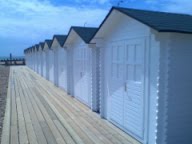He
appeared from the wooded area at the side of the drive and he came striding
down the path towards us. He was
carrying an enormous weapon under his right arm and supporting the barrel in
his left hand. “Do you call that a gun?”
he might have said to the policemen at Heathrow Airport,
“this is a gun”. And he would have been right,
it was like nothing I’d ever seen before, or want to see again.
We
were in Dorset following in the steps of my
husband’s (Lee’s) grandfather who was born at the end of the 19th
Century near Wimborne. We’d seen the
church where he was baptized, the school where he taught in 1910 and now we
were trespassing in the grounds of the house where he was born to the Butler’s daughter in
1888.
“There
it is, turn up there,” Lee said.
“I
can’t, it’s private,” I replied.
“Just
go on up the slope for a bit,” he said.
And
I did, and we found the house, and here we were, face to face with the
Gamekeeper and his gun! “You’ll have to
get out and talk to him,” said Lee.
“Why
me?” I asked.
“Well
I can’t,” he replied.
So
I got out of the car and took a few timid steps forward and said, “I’m really
sorry, I think we’ve wandered onto private land.”
“Yes
you have,” the Gamekeeper replied in a distinct West Country drawl.
I
couldn’t take my eyes off the gun. “We
just wanted to see the house. You see my husband’s grandfather was born here.”
“Well
you can’t come any closer, there’s nobody in.”
“That’s
a shame, it’s a lovely house. He was the
Butler’s
grandson.”
“Was
he?” He moved the gun slightly, perhaps
to remind me that it was there; as if I’d forgotten.
“Yes. Well, we’ll just turn round and leave then.”
“That’d
be best.”
As
I turned the car round I saw him sling the gun over his shoulder and walk
slowly back towards the woods.
I
was certainly pleased to get back to our Travelodge that afternoon, and in one
piece!
